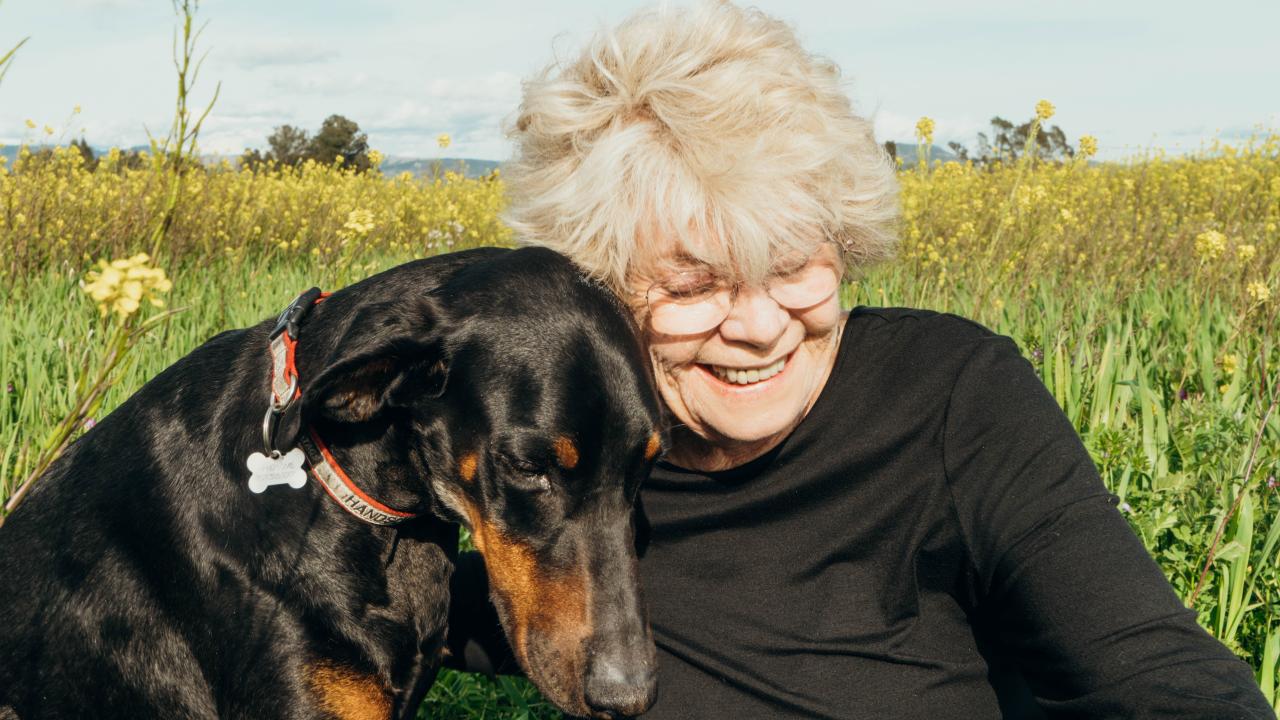
Handsome is not your typical ten-year-old Doberman pinscher. Not only does he have a very strong vocabulary (his owner Judith Friedman said he can be very demonstrative when he needs something), he is also the first participant in a clinical trial through the UC Davis Veterinary Center for Clinical Trials (VCCT) that has the promise of treating metastatic cancer in dogs. Handsome is part of the “Canine Antibody Against Lung Metastasis (CAALM) Study,” which, if successful, could improve the survival outcomes for dogs with carcinoma or melanoma that has spread to the lungs.
The treatment is an immunotherapy developed by a team of UC Davis veterinary researchers including Stephen McSorley, Ph.D., Professor and Director of the Center for Immunology and Infectious Diseases, Robert B. Rebhun, DVM, Ph.D., DACVIM, Professor and Maxine Adler Endowed Chair in Oncology, and Director of the Center for Veterinary Clinical Trials, and Michael S. Kent, DVM, DACVIM, DACVR, ECVDI (RO–Add on), Professor of Radiation Oncology in the department of Surgical and Radiological Sciences and Director of the Center for Companion Animal Health. Immunotherapies use the body’s own immune system to fight cancer cells. The CAALM study utilizes a new canine PDL1 antibody (UCD-PDL1). The trial is being led by Sami Al-Nadaf, DVM, DACVIM, Assistant Professor of Medical Oncology in the Department of Surgical and Radiological Sciences through the VCCT.
The monoclonal antibody is groundbreaking in its potential. “This type of antibody has transformed how human cancer patients are treated, but human antibodies can’t be used in dogs, so we made one specifically for dogs,” said Dr. Rebhun.
Handsome was first diagnosed with thyroid cancer several years ago. Judith recalls the day it was discovered. Handsome typically accompanies Judith to work every day, and one of Judith’s coworkers noticed a lump under his chin. Handsome’s veterinarian referred Judith to UC Davis’ William R. Pritchard Veterinary Medical Teaching Hospital for treatment. After several radiation treatments, the lump went away, and Handsome returned to “work,” enjoying his time in the office, walks with Judith, and of course treats.
Then, Handsome came down with a lung infection, which, upon further investigation, turned out to be the spread of cancer to the lung. Judith learned from UC Davis that the VCCT was running a new trial that provided some hope – an immunotherapy that would utilize a dog antibody to fight the cancer cells. “I know that Handsome is an older dog, but he could still have some wonderful years left,” Judith said. “I’m realistic, but optimistic – if this trial therapy can improve Handsome’s quality of life, and if he can help other dogs to health in the future, then the trial is worth it.”
Judith makes the drive from the Bay Area to the Center for Companion Animal Health, where the trial takes place, every other week. Handsome received his first treatment in February – there is still some time before the efficacy of the study is known. “The fact that these kinds of trials exist for pet owners is wonderful,” said Judith.
The CAALM study is one of roughly 50 studies that UC Davis’ VCCT conducts every year. Donor funding has made the pivotal difference in the study already. Jan Miller Rich is one of the donors who helped make this groundbreaking study possible. “It’s simple – UC Davis saves lives. From the work they do at the School of Veterinary Medicine that helps animals, to the work they do that translates to human health, the veterinarians and researchers that are part of the school are making a difference.”
Jan has brought her own dogs to the veterinary hospital over the years. Her dog Jenny received dialysis for three months over a summertime, and the time Jan and Jenny spent at UC Davis opened Jan’s eyes to the groundbreaking work that the school was doing in support of animals. Jan was so inspired that she joined the Dean’s Leadership Council and serves as an active member, even though her home is in Dallas, TX.
“When I heard about the work that is being done through the center’s clinical trials, I was so inspired,” Jan said. “I have seen the impact of this work already – and am so excited for the potential that this study brings. Support by donors can truly make a difference in the health of animals.”
For her part, Judith knows the trials are part of a bigger picture that UC Davis plays in supporting the health of animals. “I feel so fortunate that there is hope for Handsome, thanks to those who support this kind of work. I am committed to the wellbeing of Handsome, and other animal companions. He has given so much to me in my life – he is a joy.”
